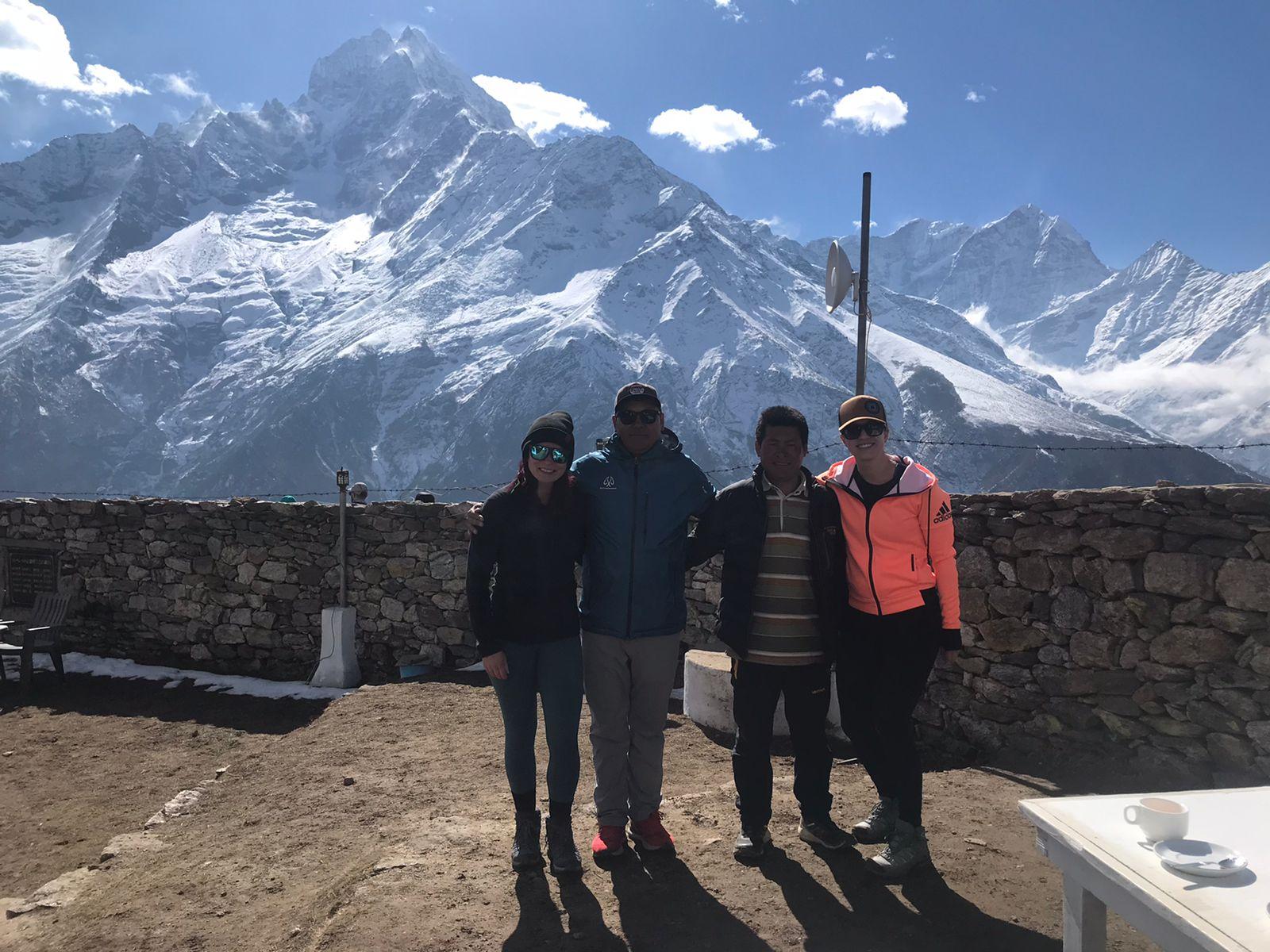-
Pasang Sherpa (Managing Director)
+977-9851060947
Since 1998 15,000+ Happy Guests Sherpa Owned & Operated Company

Everest Base Camp Trek Difficulty : How hard is everest base camp trek?
The Everest Base Camp trek is considered challenging and demanding due to its high altitude and rugged terrain. Trekkers must navigate steep ascents, descents, rocky paths, and potentially hazardous weather conditions. It is crucial to have good physical fitness, acclimatization, and proper preparation for a successful and safe journey. Additionally, it is highly recommended to join the trek with a reputable Sherpa company that has years of experience and to trek with local Sherpa guides.
The Everest Base Camp Trek is a challenging and difficult trek. However, with proper training, preparation, and guidance from an experienced Sherpa guide, the trek is achievable for most people with good physical fitness and a positive attitude. The total distance covered during the trek is around 65 kilometers (40 miles) each way, starting from Lukla and takes about 12-14 days to complete. It requires a good level of physical fitness and mental preparation as the trail involves steep ascents and descent, as well as rugged terrain, narrow bridges and altitude.
The trek starts at an altitude of around 2,800 meters (9,186 feet) and reaches up to 5,364 meters (17,598 feet) at the base camp & 5,644.5 meters (18,519 ft) Kala Patthar. Therefore, it is most important to acclimatize properly, stay hydrated, and be aware of the symptoms of altitude sickness.The high altitude can cause altitude sickness, which can be life-threatening, and hikers need to be careful and take necessary precautions.The weather can be unpredictable and can change quickly, and hikers need to be prepared for cold, winds, and snowfall.
It is recommended to prepare for the trek by engaging in regular physical exercise, such as hiking, running, or cycling, and following a balanced diet to ensure that you are in good physical condition. Additionally, it is advisable to pack appropriate gear and clothing, including sturdy hiking boots, warm clothing, and a good quality backpack.
How hard is everest base camp trek?
Overall, the hike to Everest Base Camp is a difficult trek but incredibly rewarding, offering breathtaking views of the Himalayan range and providing a unique opportunity to experience the local culture and hospitality of the Sherpa people. As you know, with proper training, preparation, and guidance from an experienced Sherpa trekking company, anyone with a reasonable level of fitness can complete the trek. It is important to acclimatize properly, stay hydrated, eat well, and take breaks as needed to ensure a safe and enjoyable trekking experience.

Here are some tips to minimize difficulty during the Everest Base Camp Trek:
How hard is the trek to everest base camp and why?
Everest base camp difficulty level : The main difficulty in the Everest Base Camp (EBC) trek:
Altitude sickness, also known as acute mountain sickness (AMS), is a common concern for trekkers who are planning to go to higher altitudes, including the Everest Base Camp.
The main difficulty in the Everest Base Camp (EBC) trek is the high altitude and its associated effects on the human body. The EBC trek takes you to an altitude of over 5,000 meters (16,404 feet), and as you climb higher, the air becomes thinner, which makes it harder to breathe. This can lead to altitude sickness, which can cause headaches, nausea, dizziness, and fatigue, among other symptoms.
To minimize the risk of altitude sickness, trekkers usually acclimatize themselves by spending a few days at lower altitudes before proceeding to higher altitudes. They also need to drink plenty of water, eat nutritious food, and maintain a slow and steady pace while trekking.
Other challenges that trekkers may encounter during the EBC trek include rough terrain, unpredictable weather, and the lack of modern amenities such as hot showers and comfortable beds.
However, there are several ways to customize your trek to make it more luxurious, it's important to keep in mind that this is still a physically demanding adventure in a remote location.
Here are some tips for planning a luxury Everest Base Camp trek:
Hire a private Sherpa guide and porter: Hiring a private Sherpa guide and porter can make your trek more comfortable and luxurious. They can help you with carrying your luggage, navigating the trails, and help to arrange everything needed. You can also customize your itinerary to your preferences, taking rest days or side trips as desired.

Stay in luxury lodges: Please visit this link and learn more about why the Everest Base Camp Luxury Lodge Trek would be the best option for you.This trek offers a unique and luxurious experience amidst the breathtaking landscapes of the Everest region. Staying in well-appointed lodges along the trail, you can enjoy comfortable accommodations, delicious meals, and warm hospitality, making your journey even more enjoyable. With this trek, you can combine adventure and comfort, immersing yourself in the natural beauty of the Himalayas while enjoying the comforts of upscale accommodations. Don't miss the opportunity to embark on this extraordinary trek and create unforgettable memories in the lap of the world's highest mountains.
While most trekkers stay in basic tea houses along the trail, there are several luxury lodges available that offer more comfortable accommodations, hot showers, and gourmet meals. you can book our one of the most popular Everest base camp luxury trek.
Use a helicopter for transportation: For a truly luxurious experience, consider using a helicopter for transportation to and from Lukla, the starting point for the trek.This will save you from the long and sometimes unpredictable flight from Kathmandu to Lukla and provide stunning aerial views of the Himalayas.
Also, it is possible to travel from Gorak Shep to Lukla by helicopter in Nepal. Gorak Shep is a small village located near the base camp of Mount Everest, and Lukla is a town located in the Everest region of Nepal that serves as the gateway to the trek to Everest Base Camp. Helicopter service is one of the fastest and most convenient ways to travel between these two places. The flight takes approximately 15-20 minutes, depending on weather conditions. You can explore our Luxury Everest Base Camp Trek with Helicopter return package for more information.
If you feel that you might not be physically prepared for the entire Everest Base Camp trek, we suggest considering the Short Everest View Trek, which takes you up to Tengboche. Situated at an altitude of around 3,867 meters (12,687 feet), Tengboche offers a magnificent vantage point for breathtaking views of the Everest region. This trek provides a fulfilling experience, allowing you to soak in the stunning landscapes and delve into the cultural treasures of the Khumbu valley. It's a great alternative that still offers an unforgettable adventure in the Everest region while accommodating those who prefer a shorter and less strenuous journey.
Here are some tips to help you avoid altitude sickness during your Everest Base Camp trek:
Remember, altitude sickness can be life-threatening, and it's essential to take it seriously. With proper preparation and acclimatization, you can have a safe and enjoyable Everest Base Camp trek.
When embarking on the challenging journey of an Everest Base Camp trek, it is crucial to prioritize your safety and well-being. Altitude sickness is a serious concern that should never be taken lightly. However, with proper preparation and acclimatization, you can mitigate the risks and have a safe and enjoyable experience.
One excellent way to ensure a successful trek is by planning your journey with an expert Sherpa company. Mountain Sherpa Trekking is a highly reputable trekking and expedition company in Nepal. With our extensive experience and knowledge of the region, we specialize in organizing unforgettable trekking trips to renowned destinations such as Everest Base Camp, Annapurna Base Camp, and the awe-inspiring Manaslu Circuit.
By choosing Mountain Sherpa Trekking, you can rely on our expertise in handling intricate logistics, providing expert guidance, and ensuring your safety throughout the journey. We understand the importance of acclimatization, pacing, and taking necessary precautions at high altitudes. With our support, you can fully immerse yourself in the breathtaking beauty of the Himalayas and create lifelong memories.
Embarking on an Everest Base Camp trek is an incredible adventure, and partnering with a trusted Sherpa company like Mountain Sherpa Trekking will give you peace of mind and the confidence to conquer the challenges along the way. So get ready to embark on this once-in-a-lifetime experience with the assurance of a safe and successful journey.

E-mail: info@mountainsherpatrekking.com
![]()
Write us to on WhatsApp: +977-9851060947